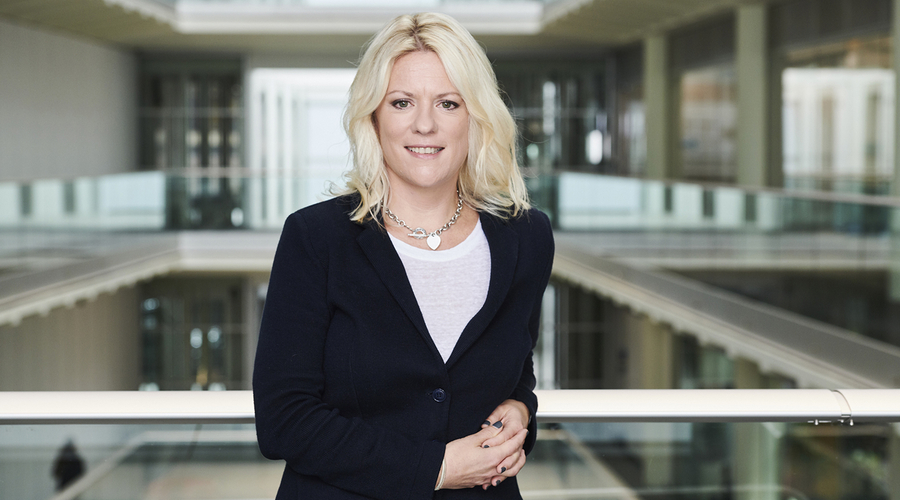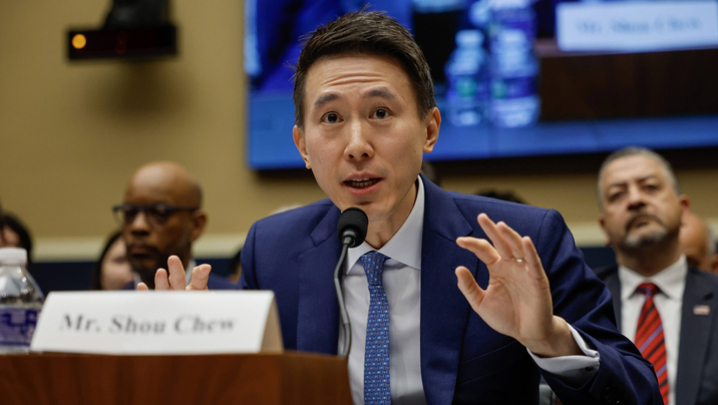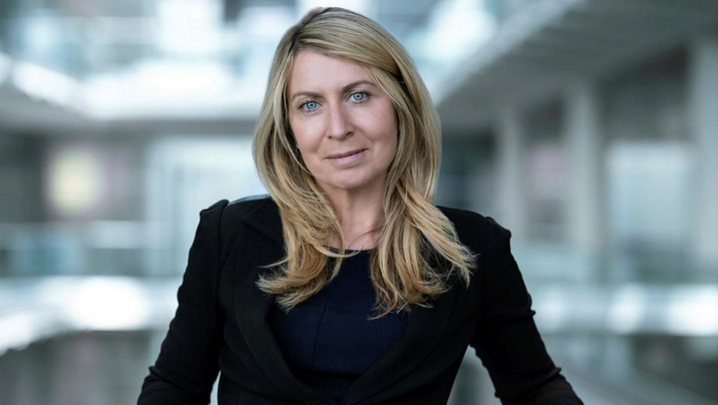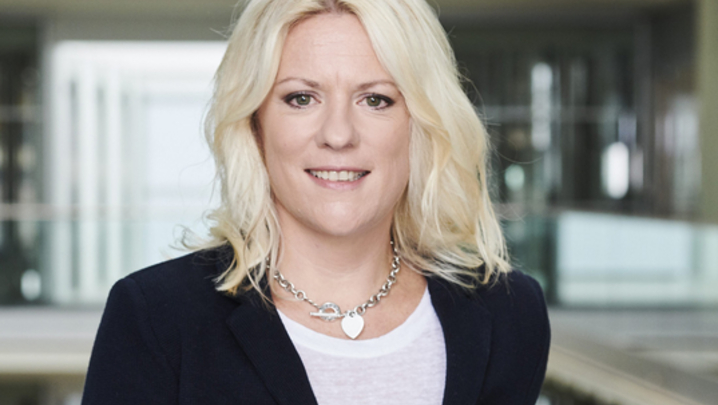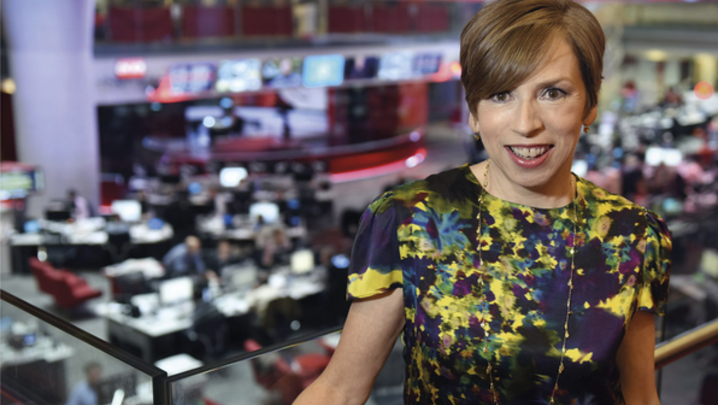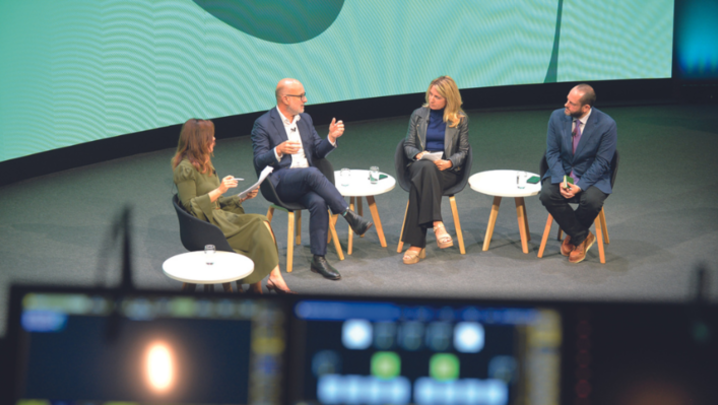In her first interview since taking over, ITN CEO Rachel Corp explains to Steve Clarke why ‘bold, original content’ is the company’s stock-in-trade.
War in Europe, economic instability and non-stop turbulence at Westminster, not to mention the impact of climate change – running a news organisation in 2023 is not for the faint-hearted. Yet Rachel Corp, CEO of ITN since last September, seems remarkably relaxed. And that’s without adding to the mix the challenge that mainstream media faces from digital giants.
It’s budget day but you’d never know it as the news chief reflects on a fascinating career and the threats and opportunities that ITN confronts in an online era. Her working life has taken her from the killing fields of Kosovo via upheaval in Moscow, working for the BBC, to editing each of ITN’s flagship news services, Channel 4 News excepted.
Prior to joining ITN as a trainee in 1995, she was a freelance presenter on Radio 4, filing stories from international hotspots for programmes such as Woman’s Hour.
So, does she not miss the cut and thrust of being a news producer or reporter? “To a degree, but ITN is always about making engaging content and it’s about being creative, so I don’t feel too far away from that creativity. Our three newsrooms are still at the heart of what we do. I still chair an editorial meeting every morning at 10.00am.
“We have fantastic editors. I don’t have to intervene and tell them what to do – just as I was allowed to when I was an editor.”
Having said that, Corp says she is enjoying putting her energy into the other parts of ITN’s activities, be it sports, education or the factual foundation that underpins ITN Productions. “It’s all got that ITN ethos,” she emphasises before adding: “Yes, of course my job is to grow the company, but it’s still in areas I care very passionately about.”
Like most media organisations, ITN took a hit from the pandemic as profits slumped. Some of ITN Productions’ content had to be put on hold but it was able to continue making its much-sought-after documentaries about the British royal family – Channel 5 is a big customer.
ITN Productions’ content ranges from fast-turnaround live specials, including the recent Vanished: Where is Nicola Bulley? to Tom Bradby’s high-profile interview with Prince Harry. Clients include the UK broadcasters and US streamers, including Amazon Prime, Netflix and Peacock. It produced a record 1,115 hours in 2022. Corp wants to see even more business generated in the US and internationally.
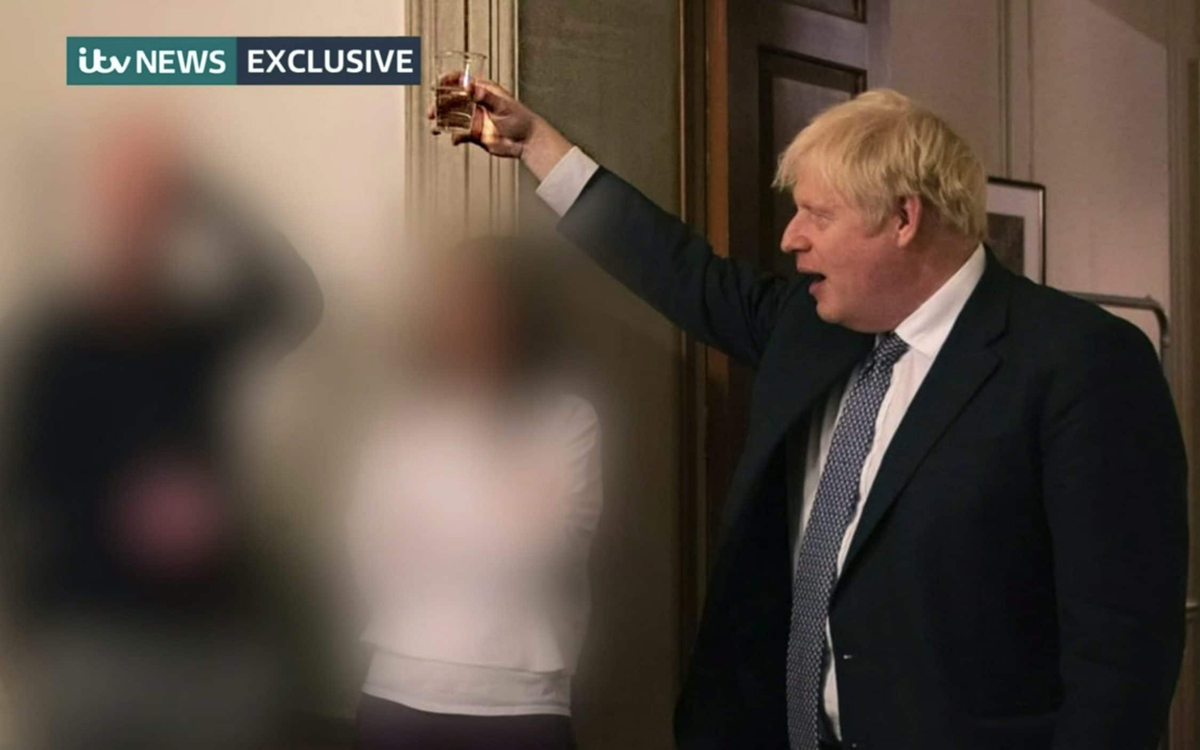
On the other hand, ITN’s core business – supplying news to ITV, Channels 4 and 5 – came into its own when the need for public service TV news became all too obvious during the lockdowns. These services all remained on air as staff learnt new ways of working.
Three years on, the CEO says that ITN’s numbers have recovered, and the company is back to where it was pre-pandemic in terms of its profit trend. “I can’t deny it’s a challenge, but having that security in our news contracts is helpful.”
Earlier this year, Channel 5 renewed its ITN contract for another five years. ITV News continues its award-winning form, not least for its Partygate coverage, which was responsible for a trio of prizes at the RTS Television Journalism Awards in early March.
Moreover, following the Gary Lineker row and the fallout from questions over BBC Chair Richard Sharp’s closeness to Boris Johnson, whom he is alleged to have helped procure an £800,000 loan, a recent poll commissioned by The Observer claimed that ITV News is now more trusted than the BBC’s news output.
Corp describes ITN’s stock-in-trade as “bold, original content”. Perhaps nothing encapsulates this approach more than ITV News’s dogged pursuit of Partygate and the succession of scoops delivered so confidently by UK editor Paul Brand.
“We are impartial, but we are there to hold authority to account. On Partygate, we’d obtained some evidence and wanted to ask the questions that needed asking,” says the CEO. “Every time we had a new angle on the story, we all sat down and said to ourselves, ‘Let’s take [people] back to where we were at that time, what our viewers were experiencing and the restrictions that they were living under.
“It wasn’t ‘Westminster bubble, here’s a good story against the Government’, but ‘Hang on, these are the people running the country’. We always talked to people out there in the constituencies to see how much they cared. Every time, people told us that they felt very strongly about what they were hearing.”
Perhaps this is ITV News’s advantage over its rivals, its ability to be less London-centric and to try and understand what people outside the capital are thinking. Corp is determined that ITN should provide journalism that audiences can genuinely relate to and which is accessible without being patronising in any way.

“We carried on with Partygate because people wanted us to and not because we had a particular agenda about the Prime Minister,” she insists.
Equally important is to provide viewers with “eyewitness reports”, an approach encapsulated by Robert Moore’s RTS award-winning Storming of the Capitol: The Inside Story report covering the Washington riot in January 2021 in support of former President Trump. This kind of journalism is on the back foot in many TV newsrooms around the world due to economic pressures, but not at ITN.
“We’ve kept it as a priority. ITN doesn’t rely on talking heads in a studio. It’s vital to have people on the ground. It’s what British TV journalism does best. When Kabul fell, John Irvine was the only TV journalist there with the Taliban. Our audiences expect us to be at the heart of the action.”
This kind of reporting costs money and times are hard. We know the BBC is cutting back on some of its journalism. Is Corp confident that ITN won’t also have to make economies in these inflationary times? “We’re used to prioritising the stories that matter most. We’ve never been able to cover everything, so your day starts with deciding what’s important.”
Eyewitness reporting is something woven deeply into Corp’s own career. At university in Leeds – she read history – she set up and ran the student radio station before, showing a high degree of initiative, hitching a ride to war-torn Bosnia, where, as a freelancer, she filed reports for Radio 4. On her return, she joined ITN as a trainee and has never looked back.
Corp, who begins her day by listening to Radio 4’s Today, was part of the launch team at Channel 5 News, where she ran the news desk and did some presenting. “That was fantastic – a real start-up culture, with all hands on deck. It was all about risk-taking and using your initiative, and pushing boundaries while still being part of mainstream news, a great place to cut my teeth at ITN.”
Almost 30 years later, today’s news environment is unrecognisable, and the priority is continuing ITN’s onward march into digital, without diminishing the impact of the organisation’s daily broadcast bulletins.
“When I edited ITV News, my emphasis was on original journalism that will have a lot of impact. When we have an original story, we’ll build it up to make sure it’s big enough to be a lead story and it will have a reaction piece after it.
“We’re already thinking about the next day and where we’re taking it. We don’t just make an interesting feature and put it at the bottom of the programme.”
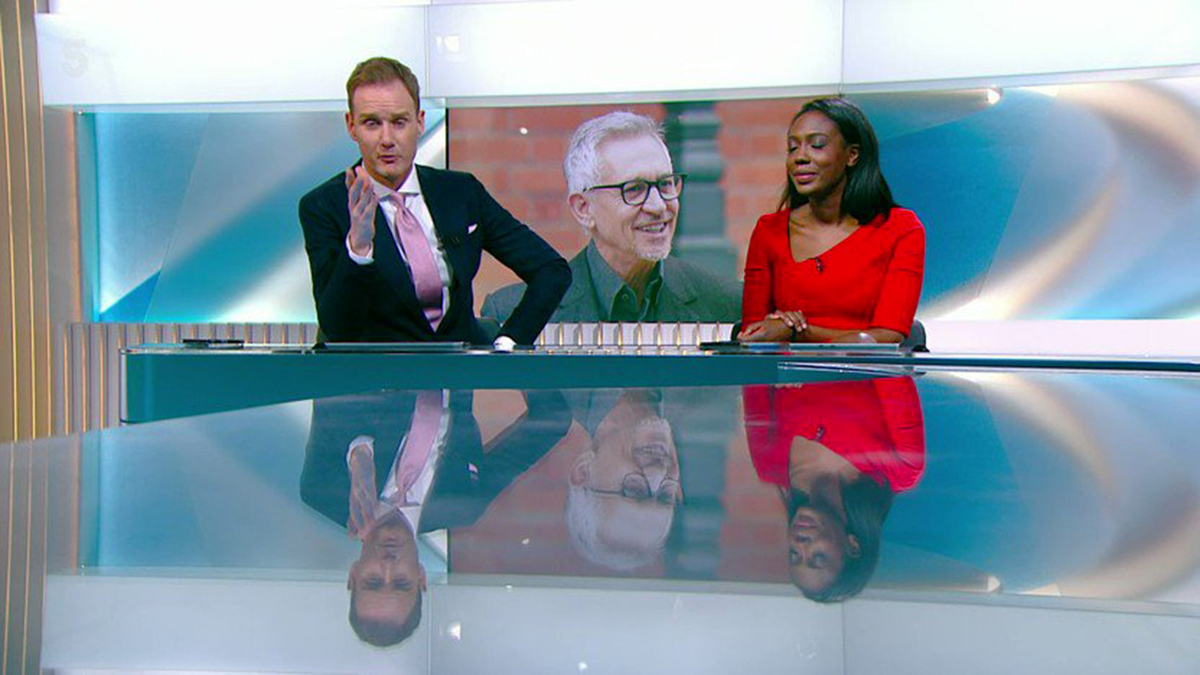
Equally, it’s vital to ensure that ITN makes a splash on YouTube and TikTok, as well as other social media platforms. The ITV News TikTok account has grown to 1.8 million followers, with over 100 million views for ITV News in March. Channel 4 News claims over 12 million social followers, netting over 60 million views per month.
Of course, much of the social media content from the company’s newsrooms is aimed at young people. She stresses that this content has to be true to ITN’s values: “We need to get content out quickly on the different platforms, particularly on those trickier stories such as Partygate. It’s not all clickbait, rather, ‘Here’s an issue that matters, let’s get it out there quickly.’
“If you take something like Partygate or social housing, we always have a clear digital plan. It’s important to get different bits out to different platforms. Big, original stories are still interesting to every age group, it just depends how you tell them and where. Channel 4 News now has a digital-first approach and that has helped it gain more younger viewers.”
Nevertheless, it is vital that, in a world where streaming is so important, public service broadcasting news is given prominence. Her first speech as CEO, last autumn, tackled this topic. “There is a concern, where broadcasters sit in a non-linear, streamed world, that needs addressing within licence renewal,” says Corp. “Where everything you watch is determined by your ‘likes’, there’s a danger you’ll end up in a news desert.”
'If everything you watch is determined by your "likes", there's a danger you'll end up in a news desert'
With a draft Media Bill finally published last month, the ITN CEO is cautiously optimistic: “I welcome the broad principles outlined in the draft Media Bill, which should result in PSBs’ content being found more easily online. It is vital that the Media Bill makes swift progress and becomes law as a means of protecting the UK’s unique broadcasting landscape.”
She adds: “The details of how to ensure that audiences can easily access trustworthy, impartial and regulated information in a polarised digital environment must be key considerations as the bill develops.”
Corp must be pleased that ITV News is, according to the previously mentioned poll, more trusted than BBC News. But is there anything she envies about the coverage of her main British competitor? “I think, with my love of international news, that there’s something about having people all over the world.
“On TV, sometimes I think that we make quick choices, so we do hit hard. I think ITV News and Channel 4 News’s TikTok coverage have been faster and slicker but, when the BBC catches up, it often has the resources to do things on a bigger scale.
“Also, it has been able to exploit podcasts very well because it doesn’t need to commercialise them. A lot of podcasts make interesting content without making vast sums of money.
“Not having that commercial pressure when you do products like that would be very nice to have. I have a huge respect for the BBC, but I am very, very proud of what we do.”

